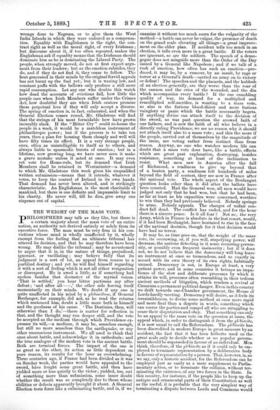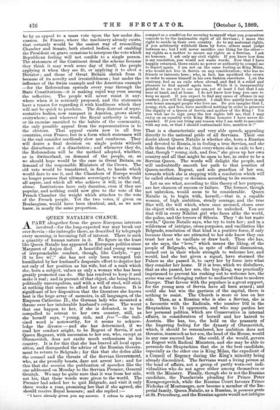THE WEIGHT OF THE MASS VOTE.
defeat; and after all ' the other side forcing itself momentarily on their minds. We doubt if any one is quite unaffected in his mind by a plebiscitum, if General Boulanger, for example, did not, as he read the returns which sentenced him, doubt a little more both in himself and the goodness of his cause. The Destinies, then, will otherwise than I do,'—there is matter for reflection in that, and the thought may run deeper still, and the vote be accepted as the medium through which Providence ex- presses its will,—a medium, it may be, senseless enough, but still no more senseless than the earthquake, or any other unconscious instrument. We all used to think that once about battle, and acknowledge it in cathedrals ; and the true analogue of the modern vote is the ancient battle. Both are terminal forces. The impact of the one is as great as the other, its action as little dependent on pure reason, its results for the hour as overwhelming. Three centuries ago, if France had been divided as it was on Sunday week, the parties would have appealed to the sword, have fought some great battle, and then have yielded more or less quietly to the victor ; yielded, too, out of something more than submission, some inner doubt whether the result was so completely due to those whose abilities or defects apparently brought it about. A General Election tests force like a culminating battle, and is, if we examine it without too much scorn for the vulgarity of the method—a battle can never be vulgar, the presence of death on the grand scale elevating all things—a great improve- ment on the elder plan. If accident tells too much in an election, it tells even more in a great battle. If the voters are ignorant, so are the soldiers. The speech of a dema- gogue does not misguide more than the Order of the Day issued by a General like Napoleon ; and if we talk of a. rush of emotion, how often has such an emotion—pro- duced, it may be, by a rumour, by an insult, by rage or terror at a General's death—carried an army on to victory or defeat ! The speeches and the placards, and the hubbub of an election generally, are they worse than the roar of the cannon and the cries of .the wounded, and the din which accompanies every battle ? If the one ennobling quality of war, its demand for a. multiplied and remultiplied self-sacrifice, is wanting to a mass vote, so also is the furious blood-thirst and more furious vainglory or panic which the battle necessarily begets. If anything divine can attach itself to the decision of the sword, as was past question the avowed faith of our fathers, and is now the faith of all who believe in a directly ruling Providence, we see no reason why it should not attach itself also to a mass vote ; and this the more if the people, carried out of themselves by the magnitude of the issue, are voting rather from instinct than from reason. Anyway, no one who watches modern life can doubt that a mass vote does have, like a battle, effects which are great past explanation, destroying, besides resistance, something at least of the inclination to resist. What men saw in America, after the fall of Richmond, a readiness to give up beyond that of a beaten party, a readiness felt hundreds of miles beyond the field of contest, they see now in France after the national vote. The whole aspect of the Boulangist question looks other than it did after the ballots have been counted. Had the General won, all men would have not only that he had won, but that he had been, as far at least as his capacities were concerned, worthier to win than they had previously believed. Nobody springs to arms. Nobody appeals. The charges of unfair con- duct fall dead. The conflict has ended, and for the hour there is a sincere peace. Is it all fear ? Not so ; the very Army, which in France is absolute in the last resort, would,. if it had been Boulangist, have hesitated to rise in the face of the national decision, though for it that decision would have had no terror.
It may be, as time goes on, that the weight of the mass. vote, its overawing, or, if you will, stupefying power, will decrease, the nations detecting in it some recurring perver- sity, or possibly even frequent insincerity ; but if it does not, we do not believe that the democracy will long leave. an instrument at once so tremendous, and so exactly in. accord with its own theory of its own rights, habitually- unused. Democracy is not, in Europe at least, a very patient power, and in some countries it betrays an impa- tience of the slow and deliberate processes by which it attains its will, processes often resembling in their tedium. ancient methods of litigation, which renders a revival of CEesarism a permanent political danger. Even in this country we drift towards one-Chamber government, the House of Lords hardly meeting. Democracy will desire, as it feels its irresistibleness, to devise some method at once more rapid and more final than a dispute in words, something which can coerce the parties and compel all who are struggling to cease their disputation and obey. That something can only be an appeal to the mass vote on the question at issue, the appeal which, in order to distinguish it from the plebiscite, it is now usual to call the Referendum. The plebiscite has been discredited in modern Europe in great measure by an accident, the fact that it has been hitherto used on the- great scale only to decide whether or no popular govern- ment should be superseded in favour of an individual. Men think, therefore, of the plebiscite as if it could only be em- ployed to terminate representation by a deliberative body in favour of representation by a person. That, however, is, as we say, only a historic accident, for the Referendum can be employed just as easily as a mere supplement to Parlia- mentary action, or to terminate the collision, without ter- minating the existence, of any two forces in the State. In this country, for instance, if the people like to keep up the antique and ornamental parts of their Constitution as well as the useful, it is probable that the very simplest way of terminating a dispute between Lords and Commons would be' y an appeal to a mass vote upon the law under dis- cussion. In France, where the machinery already exists, that certainly would be the easiest way of reconciling Chamber and Senate, both elected bodies, or of enabling the President on grave occasions to interpose the veto which Republican feeling will not confide to a single person. The statesmen of the Continent dread the scheme because they think it may work some day of itself, the people applying it when they see fit, or applying it to elect a Dictator ; and those of Great Britain shrink from it because of its novelty and irresistibleness ; but under the influence of the Swiss example and the American example —for the Referendum spreads every year through the State Constitutions—it is making rapid way even among the reflective. The people will never resist it any- where when it is seriously proposed, and the statesmen have a reason for regarding it with kindliness which they will not be quick to proclaim. The deep distrust of repre- sentative bodies, now rampant in America, grows slowly everywhere ; and wherever the Royal authority is weak, or its exercise unsuited to the habits of the community, the only possible appeal from the representatives is to the electors. That appeal exists now in all free countries, even France, but in a form which statesmen will in the end consider needlessly slow and cumbrous. They will desire a final decision on single points without the disturbance of a dissolution ; and whenever they do, the Referendum will be the method adopted, whether, as in Switzerland, on demand of the people, or, as we should hope would be the case in Great Britain, on demand of the responsible Ministers of the Crown. The old veto would be transferred, in fact, to hands which would dare to use it, and the Chambers of Europe would no longer possess that ultimate sovereignty to which they all aspire, and which all who achieve it will, in the end, abuse. Institutions have only duration, even if they are popular, and nothing could now give to the vote of the French Chamber the weight which attaches to the vote of the French people. Yet the two votes, if given on Boulangism, would have been identical, and, as we now know, in nearly the same proportion.







































 Previous page
Previous page